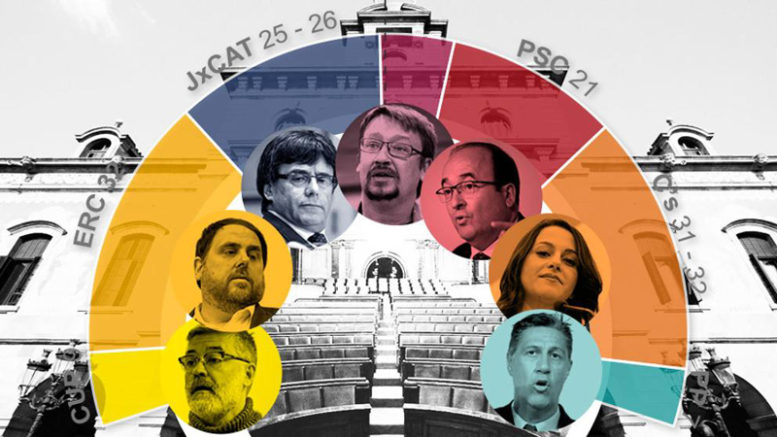► Failure of either bloc to win majority of seats could lead to hung parliament ►
The four most recent surveys of voter preference in upcoming regional elections in Catalonia all point to one thing: a statistical “dead heat” between parties for and against the northeast region’s independence from Spain and the increasing likelihood of a hung parliament, given the stated aversion of parties on either side of the divide toward forming a coalition government that would include their opponents on the independence question.
All four polls released between 29th November and 9th December show pro-independence parties Esquerra Republicana de Catalunya (ERC, Republican Left of Catalonia), Partit Demòcrata Europeu Català (PDeCAT, formerly Convergència Democràtica de Catalunya) and the far-left Candidatura d’Unitat Popular (CUP, United People’s Candidacy) likely to fall short of a majority of votes in the 21st December contest. All the polls show anti-independence parties Ciudadanos and the Socialist party (PSC-PSOE) gaining ground on their opponents, with the conservative Partido Popular (PP) losing one or two seats in the Catalan regional Parlament.
The regional elections were called at end-October by Spanish President Mariano Rajoy of the governing PP after imposing home rule of Catalonia by the central government in the aftermath of the illegal 1st October independence referendum and declaration of independence by the former independentista majority in the Parlament.
The four voter surveys (Metroscopia, CIS, GESOP and GAD3) indicate a surge in support for anti-independence parties, particularly the centre-right Ciudadanos party, that could give a majority of ballots to the constitutionalista bloc, so-called for their support of the country’s 1978 Constitution, which forbids independence referendums or secession from Spain. Yet even with an overall majority of votes cast, the constitutionalista parties are likely to fall short of a majority of seats in the Parlament because of a skewed representation system that favors rural and provincial voters of the Catalan interior over urban voters in and around Barcelona and the cities of Tarragona and Lleida, where voter support for the anti-independence parties Ciudadanos, PSC and PP is strongest.
On the political left, leaders of the Catalunya en Comú (CeC) Podem alliance between Barcelona mayor Ada Colau’s newly formed Catalunya en Comú party and the Catalan affiliate of four-year-old national anti-austerity party Podemos, has suggested the deadlock be broken by a transversal alliance of leftwing parties, including Catalunya en Comú (CeC) Podem, PSC-PSOE and the ERC, the pro-independence party likely to score the most votes on the political left. But, two obstacles have emerged to that possibility: first, PSC candidate Miguel Iceta says he will not endorse a coalition government led by any ERC candidate; and, second, the Catalunya en Comú (CeC) Podem alliance appears to be fast losing voter support , due in part to vacillations on the independence question by both Colau and Podemos’ national leader Pablo Iglesias, and may not hold enough seats in the Parlament to break the deadlock.
On the political right, despite the surge in support for Ciudadanos, the centre-right party would need at a minimum the support of both the PP and PSC to block the independentista block from controlling the Parlament and the PSC’s Iceta has said that his party will not form a governing coalition with the PP, nor will he endorse Ciudadanos candidate Inés Arrimadas to lead the next government. A transversal coalition involving Ciudadanos, PSC and Catalunya en Comú (CeC) Podem also appears impossible, given Podemos’ veto on forming any government in Catalonia in coalition with Ciudadanos.
One thing all the voter surveys predict is a very high voter turnout, on the order of 80-82 percent, unprecedented in Catalan regional elections, which traditionally are beset with more voter apathy than are elections to Spain’s national Congress of Deputies. While some analysts say such a turnout could benefit the anti-independence parties, there is no real way of accurately measuring the impact of such a high turnout and the results in terms of seats in the Catalan Parlament remain virtually anyone’s guess.
► Read More in Spanish at La Vanguardia, El Periódico and El País …
► Read More in English at El País, Politico and AFP via TheLocal.es …


